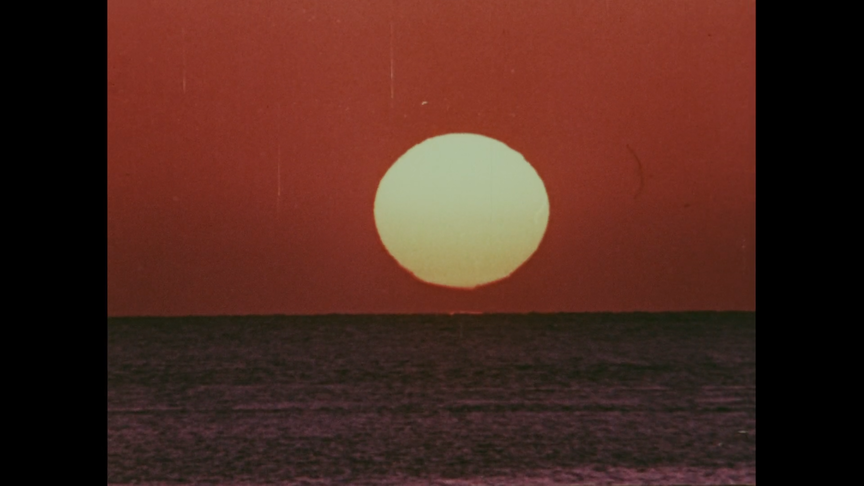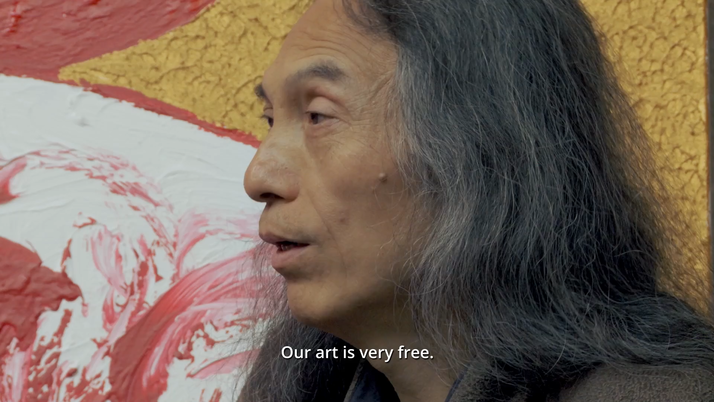
R
E
V N
E
X
T
Portrait of the art group, STARS, 1980. Copyright Helmut Opletal. All images courtesy AC Films, Inc.
The title of Beijing Spring (2021)—Andy Cohen and Gaylen Ross’s heartfelt, candid, and well-crafted documentary—refers to a brief, tumultuous watershed in Chinese history that began with Mao Zedong’s death in September 1976 and ended with the crackdown on Beijing’s Democracy Wall (a public forum of sorts where citizens put up big-character posters critiquing societal issues); the arrest of activist Wei Jingsheng, who racked up 18 years in Chinese prisons; and the shutdown of the avant-garde Stars Art Group’s open-air exhibition in late 1979.
Meticulously constructed in chapters, the film is an ideal primer in the cultural and political events of the period. It begins ominously with grainy black-and-white Super-8 home movies from 1960s Beijing, a colorful panorama of Mao worshippers waving Little Red Books in the presence of the Chairman himself, and closeups of cramped living spaces and heavy bicycle traffic indicative of the poverty of the era, before the film turns briskly to a historical overview of the Democracy Wall and the birth of the Stars Art Group.
The group’s name was suggested by dissident artist Ma Desheng: “Every one is a star in the sky. Each has their own freedom, their own soul. At the time, we felt we could call ourselves ‘The Stars,’ because Mao was the only sun in the sky.” The artists had little in common in terms of their artistic training and family backgrounds, which ranged from hardscrabble to privileged. For some Stars, their only contact with non-socialist art outside of China came from books or magazines that had been verboten for a decade or more. It should be no surprise that this environment of economic and cultural deprivation produced little great art, but rather a corpus of modest experiments that sowed the seeds for the creative and economic explosion of Chinese contemporary art in the following decades.
The documentary covers the quicksand years of the dissident movement’s emergence in strict chronological order, introducing the protagonists intimately via contemporary footage, photographs, and stills of key local samizdat and foreign journalistic articles. The documentary also surprises the viewer with interviews conducted after 2015 with the same cast of characters, now a cohort of septuagenarian survivors who seem to have made peace with their pasts; some still affect long-haired bohemianism while enjoying comfort and artistic success in China and overseas.
The large constellation of artists, photographers, cinematographers, collectors, critics, museum curators, and Western academics can be confusing for the uninitiated on first viewing, but their statements, memories, and analyses of the late 1970s, some 40 years after the fact, coalesce in a coherent narrative. The main players later appear in arranged meetings that exhibit some of the tedium, embarrassment, and soupy sentimentalism of long-delayed high-school reunions. The now notorious artist Ai Weiwei, who joined the Stars relatively late, is allotted an uncharacteristically brief appearance. Uli Sigg and Guy Ullens, two key foreign patrons who made monumental contributions to perpetuating the art of the Stars and their slightly younger contemporaries, are regretfully missing.
Photo of the march demanding artistic freedom on the National Day in Beijing, 1979. Copyright Wang Rui.
The most valuable, breathtaking moments in this film derive from archival footage: the mounting, without official permission, of an art show on the National Art Museum of China’s fence, which evokes jail bars when the Beijing police come to shut down the show; the motley crowd assembled before the Beijing government headquarters, awaiting a verdict on remounting the show; and crutch-carrying Ma Desheng valiantly leading a protest march on October 1, 1979, the 30th anniversary of the founding of the People’s Republic of China.
Much to its credit, the film is politically spicy, but mildly so, and this reviewer would wager that it is just polite enough to be shown in China. While presenting few new historical revelations, Beijing Spring is an essential document that chronicles several key events in the transformative history of 20th-century China, with works of art playing minor roles and young artists shining as pioneers.
Don J. Cohn is ArtAsiaPacific’s senior editor.
As part of the 19th International Film Festival and Forum on Human Rights in Geneva, Beijing Spring is screening online on demand during March 5–14, 2021. The film will be featured in M+ Screenings Online during March 11–21, and open the 39th International Festival of Films on Art in Montreal March 16–28.
To read more of ArtAsiaPacific’s articles, visit our Digital Library.












